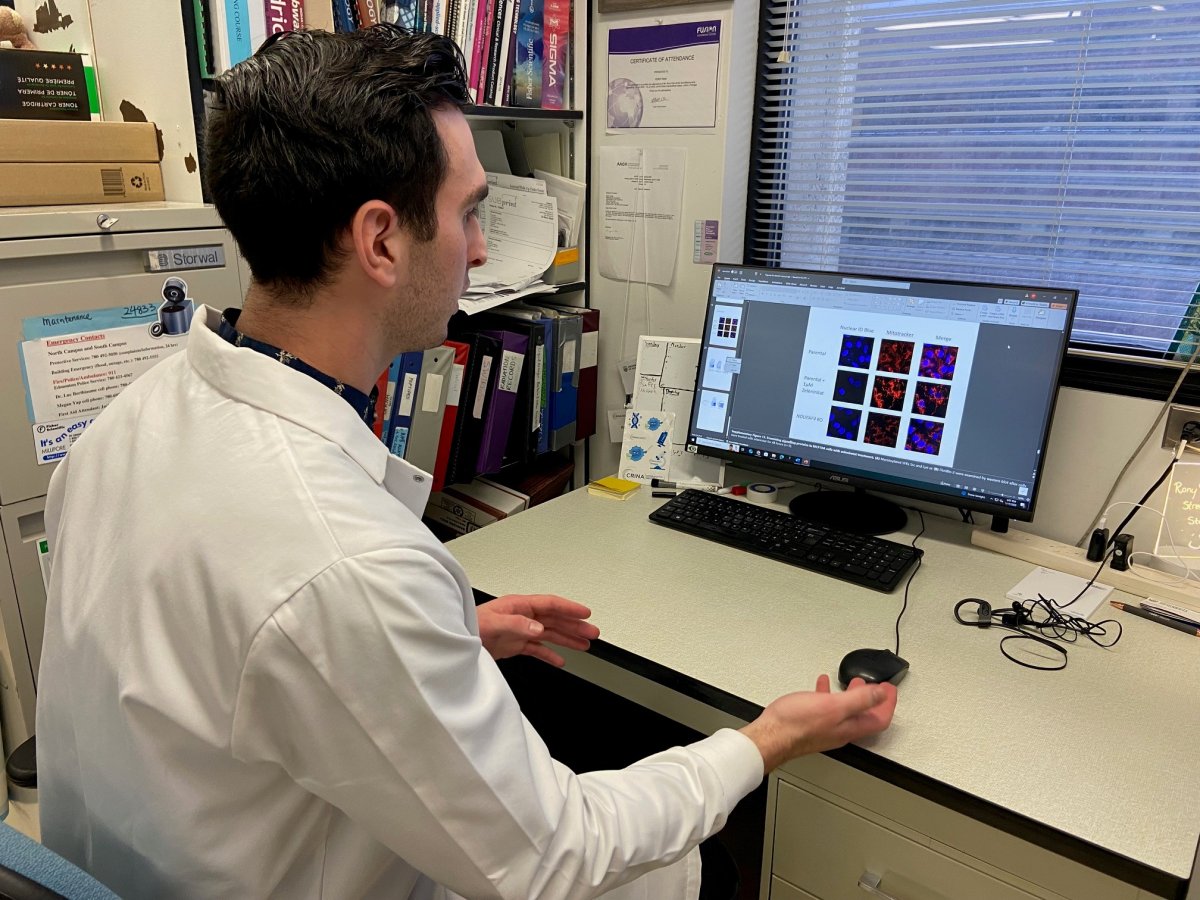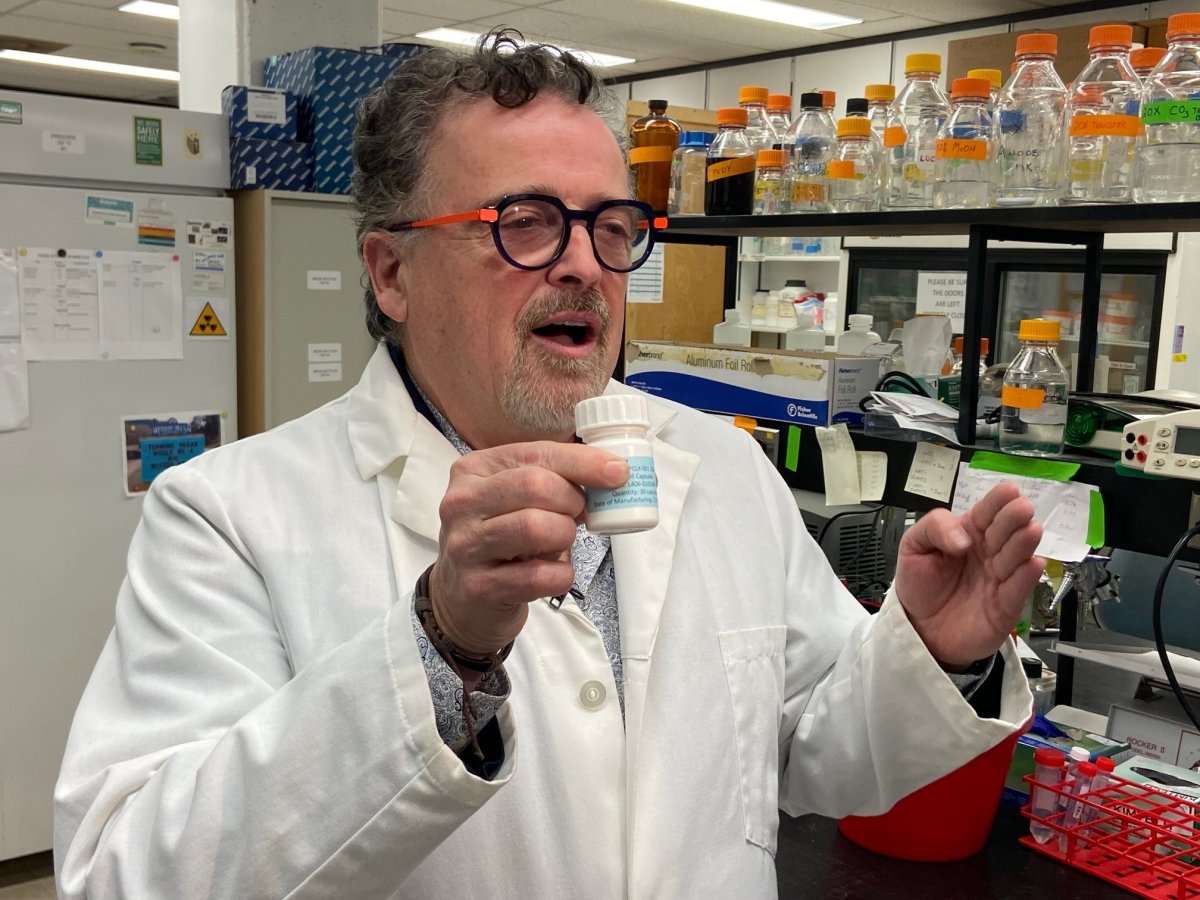Imagine being able to treat cancer by taking one pill a day. Right now, a research team at the University of Alberta is trialing just that.
Professor Luc Berthiaume has been working to find a cure for cancer for decades.
“I came here to find a new way to kill cancer cells with minimized side effects,” Berthiaume said of joining the U of A.
Years ago, he had an idea to treat cancer in an unconventional way. His idea even got him laughed at while attending graduate school at the Université de Sherbrooke in Quebec.
But now, clinical trials are proving his theory by attacking mitochondria in cells.
“It inhibits the cell signalling inside cells that tells cells to grow aberrantly without stopping. They grow, grow, grow,” Berthiaume explained.
“In addition to inhibiting the growth, our drug suffocates the cells and starves them and this effect is more preponderant in the cancer cells, rather than in normal cells.”
His novel drug shuts down the cell’s metabolism, preventing them from converting oxygen into energy.
That could save lives.
“It’s the spread, or metastasis, of the cancer that really causes the cancer-related mortality people face,” explained PhD candidate Rony Pain, who’s working in Berthiaume’s lab.
PhD candidate Rony Pain shows how Zelenirstat works.
Sarah Ryan / Global News
The theory was first tested on cells, then in mice, and then on cancer patients with just a few months left to live.
“Our pill, named Zelenirstat, can be taken in the comfort of home. No need to go to the hospital, no injections, it’s very easy. The compound is water-soluble, goes right into the blood and affects the tumours,” Berthiaume said.
The first patient to test the pill was in Edmonton at the Cross Cancer Institute.
Then the pill was shared out to other Canadian cancer hospitals, including the BC Cancer Care Centre, The Princess Margaret Hospital in Toronto, and the Centre Hospitalier de l’Universite de Montreal.
Phase 1 of the clinical trials focus on the safety on the new treatment, but Berthiaume said in the case of Zelenirstat, the data proved it works.
“We got a lymphoma patient that got a 30-per cent tumour reduction within just two to three weeks of treatment, so we were absolutely ecstatic because then we knew, yes, we do have something.”
One patient with a life expectancy of just a few months survived for 18 months on the pill.
“Already that Phase 1 trial showed that it was safe and also efficacious.
“It shows that it delayed the relapse of tumours and it also extended the life of patients.”
The results were so promising, the American health authority took notice.
“We have what’s called a fast-track designation. It’s an orphan disease with the (Food and Drug Administration). It means that we could start commercializing and distributing the drug as soon as Phase 2 is done. No need for Phase 3, no need for Phase 4.”
Luc Berthiaume has been working on a treatment for cancer for decades.
Sarah Ryan / Global News
The scientists said their medication works best on blood cancers such as lymphoma or acute myeloid leukemia, but it can also help with advanced solid cancers — tumours in the brain, lungs or ovaries.
Pain’s PhD project is analyzing how the pill could help those with triple-negative breast cancer: a very aggressive from that doesn’t have the typical receptors on cells for treatments to adhere to.
Pain has been assisting on the Zelenirstat project for four years.
“It’s, frankly, quite amazing and truly humbling at the same time. I get to wake up, come here and maybe make a difference in some patients lives.”
It’s also easier on the body than traditional treatments like chemo and radiation.
“One of the things that’s really exciting about our drug is that it’s one pill a day with minimal side effects,” Berthiaume said.
“People have a little bit of discomfort or fatigue, but from what I was told, it’s nothing in comparison to being treated with chemotherapy or other types of therapies.”
Right now, Pacylex (Protein ACYLation EX) Pharmaceuticals Inc, the company Berthiaume co-founded, is desperately trying to raise money for its Phase 2 clinical trials. That costs US$20 million, per cancer type.
Earlier in its development, the project received funding from Alberta Innovates, the Alberta Cancer Foundation, and even the World’s Longest Baseball Game.
“The duration of Phase 2 varies, predominantly with money,” Berthiaume said.
“We need more money.”
The sooner they get that funding, the sooner this made-in-Alberta innovation will be given to more Canadian cancer patients.
To donate to the clinical trial and receive a tax receipt, head to uabgive.ca/frcb.
“If this drug is available in a few years to help those patients improve their quality of life, that’s all we can ask for at this point really,” Rony said.
Zelenirstat is a single pill that is undergoing clinical trials to treat cancer.
Sarah Ryan / Global News


